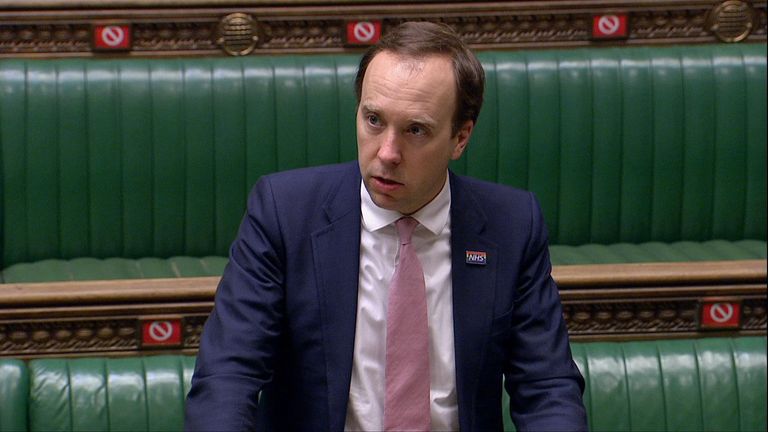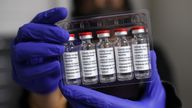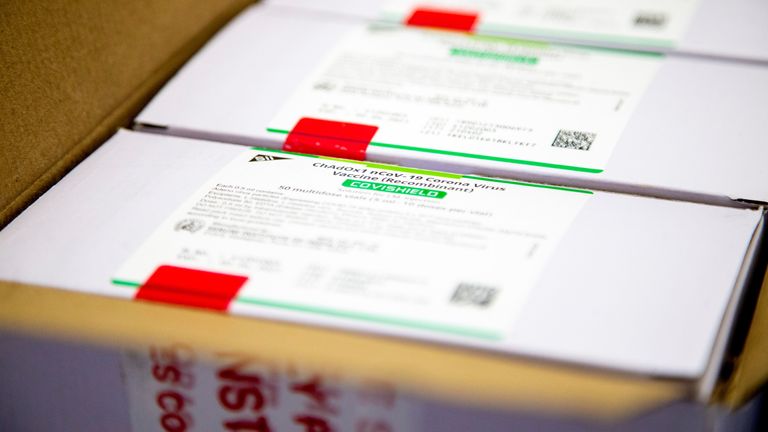COVID-19: Need to retest 1.7 million doses and delays to supplies from India behind reduced vaccine numbers, Matt Hancock says
The health secretary admits vaccine supply in April will be "tighter" when there are around 12 million second doses to deliver.
Thursday 18 March 2021 13:56, UK
A need to retest more than one-and-a-half million vaccine doses - as well as delays to doses arriving from India - will lead to a "tighter" supply of COVID jabs next month, Health Secretary Matt Hancock has told MPs.
The NHS has warned of a month-long "significant reduction" in weekly supply of vaccines in a letter to local health leaders.
Live COVID updates from the UK and around the world
Explaining the reasons for the reduced number of vaccines in April, Mr Hancock told the House of Commons: "In the last week, we've had a batch of 1.7 million doses delayed because of the need to retest its stability.
"Events like this are to be expected in a manufacturing endeavour of this complexity and this shows the rigour of our safety checks.
"And we have a delay in a scheduled arrival from the Serum Institute of India."
It is understood the delayed supply from the Serum Institute - amid suggestions of a block on exports by India's government - totals five million doses of the Oxford-AstraZeneca vaccine.
In other developments:
• First Minister Nicola Sturgeon said Scotland would have 500,000 fewer vaccine doses over the next month than had been anticipated
• The UK's supply of coronavirus jabs to Gibraltar has now seen the territory complete its entire adult vaccination programme, which Mr Hancock told MPs was a world-first
The health secretary said, during April, there are around 12 million people in the UK who require second doses of COVID-19 vaccines.
"These second doses can't be delayed as they have to be delivered within 12 weeks of the first dose," he said.
He told MPs the UK was "currently right now in the middle of some bumper weeks of supply".
But he admitted vaccine supply in April would be "tighter than this month and we have a huge number of second doses to deliver".
The health secretary reiterated the UK remains on course to offer a first vaccine dose to the top nine priority groups - including all over-50s - by the middle of next month, as well as vaccinating all UK adults by the end of July.
"I also want to clear up some rumours that have been circulating and give people reassurance; there will be no weeks in April with no first doses," he said.
"There will be no cancelled appointments as a result of supply issues - second doses will go ahead as planned."
Mr Hancock praised the partnership with the Serum Institute as one the UK "can be proud of".
He thanked them for their "incredible work" in producing one billion doses of the AstraZeneca vaccine for the UK and the rest of the world this year.
Labour's shadow health secretary Jonathan Ashworth told Mr Hancock that Britons would be "worried, anxious and disappointed" at the news on vaccines.
"We understand why there will be delays in supply, of course we understand that, but this is not fantastic news - and nor, frankly, is it expected news," he added.
An NHS letter to local health leaders across the country has warned of a "significant reduction in weekly supply" from 29 March for a four-week period.
It added that "volumes for first doses will be significantly constrained", with healthcare providers told those aged 49 and under should only be offered a vaccine in "exceptional circumstances" - such as if they are clinically vulnerable or a frontline care worker.
Vaccination centres were told to close unfilled bookings from 29 March onwards - and to ensure no further appointments are scheduled for the whole of April.
The Serum Institute has suggested India's government was blocking vaccine exports to the UK.
A spokesperson said: "Five million doses had been delivered a few weeks ago to the UK and we will try to supply more later, based on the current situation and the requirement for the government immunisation programme in India."
Analysis: Hancock gives the statement about vaccine supply he should have given a day earlier
By Sam Coates, deputy political editor
Health Secretary Matt Hancock today gave the statement about the vaccine supply squeeze that he should have given in yesterday's surreal backslapping 5pm press conference.
Yesterday he sidestepped questions of shortages, saying the changes outlined by the NHS were technical and routine.
Today he has come back with more detail: telling the House of Commons that a batch of 1.7 million coronavirus doses have been delayed due to the need to be retested, while there has been a delay in a scheduled arrival from the Serum Institute of India.
How serious is this? All government targets will still be met, and the roadmap to lift lockdown in England will be unaffected.
Yet the tone of Mr Hancock's intervention - still downplaying the change as "part of the normal management" of the rollout and "on track to meet the targets set out" - was very different to the NHS which cancelled new appointments in April and suggested the workforce involved needs to be reduced.
The mismatch is curious - and suggests tensions between the Department of Health and NHS England; a discouraging sign of division.
The full implications of the shortage are still not yet fully clear. It depends how many elements of life this summer will require people getting one or both jabs.
If vaccine passports become the norms for holidays and events, then it will mean more weeks of life on hold for those without a vaccine - predominantly the young.








